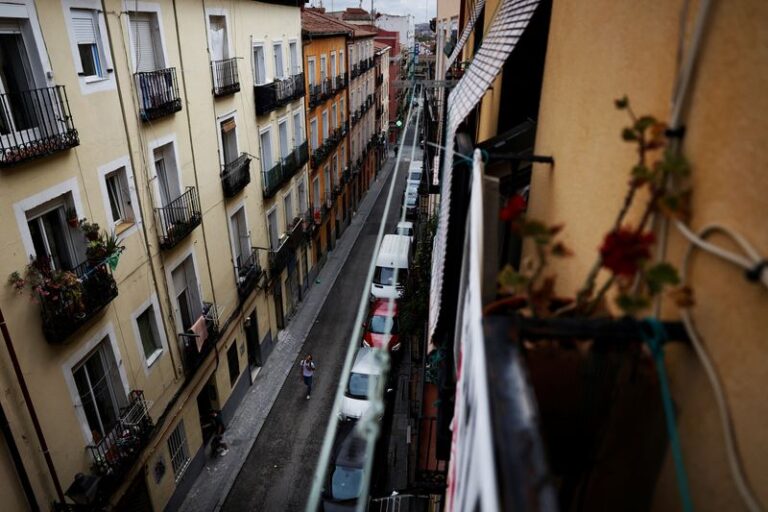Corina Pons
MADRID (Reuters) – After three years of living rough in a back room of a theatre, Francisco Carrillo lay in bed in his new Madrid home provided by a charity and cried tears of relief.
The 62-year-old pensioner had moved from Jaén in southern Spain for treatment for throat cancer but found he could not afford rent in the capital.
“I’m going to sleep like a baby tonight,” he said.
Carillo is one of many Spaniards who have been squeezed out of the housing market by a shortage of public housing and regulations that discourage long-term rentals, sending prices soaring.
The situation has been exacerbated by the proliferation of holiday rentals on platforms such as Airbnb and Booking.com, sparking a wave of protests across the country in recent weeks.
Official statistics show the number of homeless people has risen 24 percent since 2012 to 28,000, while a Bank of Spain report found that around 45 percent of people living in rented accommodation are at risk of poverty or social exclusion, the highest rate in Europe.
The European Commission said homelessness had increased significantly across Europe over the past decade but the severity of the problem was being masked in Spain because young people were staying with their parents for longer.
More than 60% of young people aged 18-34 live at home, and Spain has seen the fastest increase in the proportion of young people living with their parents between 2008 and 2022 among major European countries.
According to the report, social housing in Spain accounts for just 1.5% of all housing, compared with the European average of 9%.
Competition for private apartments is fierce: in Madrid, there are around 40 applicants for every property on sale, according to real estate website Idealista.
The Socialist government’s current social housing plan calls for the addition of 184,000 homes over the next three years, and Prime Minister Pedro Sánchez said in May that he wants to bring the social housing stock in line with the European average before his term ends in 2027.
But the Bank of Spain estimates that an additional 1.5 million homes are needed to reach this target.
The pace of home construction, at 90,000 homes per year, is lagging behind growing demand and is well below the 650,000 homes built in 2008, according to official data.
Housing Minister Isabel Rodrigues said Tuesday that the government has begun drawing up a new plan to reach this goal.
Filling in the blanks
To fill some of the gaps left by the state, philanthropic organizations are turning to private capital, even if it’s just a fraction of what’s needed.
The story continues
The apartment provided to Carrillo by Mundo Justo (Fair World) is owned by Techo, a social investment fund that provides rental housing to charities that work with homeless people, and which listed on the Spanish stock market in April with the backing of 33 business partners, including global firms such as EY and CBRE.
Techo owns about 230 apartments and works with 50 NGOs that charge rents 30% below market value. It’s also an opportunity for investors to secure returns while boosting environmental, social and governance (ESG) scores, said Blanca Hernandez, chairman of the real estate investment trust.
Another charity, Hogar Si, rents out 400 apartments to the homeless and two years ago began looking for investors to buy some of the apartments as a cost-cutting measure.
José Manuel Caballol, president of the Ogar Si Foundation, said the housing crisis requires a combination of private and public initiatives on social housing rentals.
“We need to be more ambitious,” he said.
Big cities like Madrid also have to deal with migration from the countryside to the city center where jobs are, said Diego Lozano, CEO of the city’s housing agency.
In Madrid, 48,000 people are on the waiting list for social housing, and Lozano acknowledged that while the city is working to nearly triple its social housing stock to 15,000 units by 2030, it still won’t be able to meet demand.
He also slammed recent legislation aimed at protecting tenants’ rights by allowing vulnerable people to continue living in their properties without paying rent for up to two years, saying it had a chilling effect on landlords considering long-term rentals.
Landlords are demanding that tenants provide guarantees to pay rent that the poorest people cannot afford, according to three NGOs interviewed by Reuters.
Others are turning to the higher-margin short-term market, which isn’t bound by the same regulations. While long-term rental supply has fallen 15% in a year, short-term rentals, mainly catering to tourists, grew 56% in the 12 months to March, according to Idealista.
Pensioner Carmen Cajamarca, 67, received a letter giving her a month to vacate the rental apartment she had lived in for 25 years in Madrid’s Lavapies district after it was sold to an Argentine fund that is renovating the apartment for holiday rentals.
Cajamarca said he plans to leave Madrid and wants to delay it as long as possible while he searches for a new home.
“This is just for tourists. Where are the people who have always lived here going to live?” she said.
The crisis is so severe that Spanish cities are trying to restrict or phase out holiday apartments.
In Cádiz, Eva Orihuela joined a local campaign to ban holiday rentals after her 88-year-old mother, Maria, faced imminent eviction and the local football club stepped in to buy her house and rent it out at the same rent.
Orihuela said she was relieved that her mother would still have a place to live.
“But there are many more people like Maria,” she warned.
(Reporting by Corina Pons; Additional reporting by Belen Carreno; Editing by Charlie Devereux, Aislinn Lane and Sharon Singleton)

